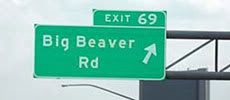|
Re: Japanese Learners Club ^.^
|
|
シンガãƒãƒ¼ãƒ«ã§ã€é€šå¸¸ã®å ´åˆã¯ã‘ã£ã“ã†æš‘ã„ã§ã™ãŒã€æœ€è¿‘毎日毎日雨ãŒé™ã‚Šã¾ã—ãŸã‹ã‚‰ã€ã‹ãªã‚Šæ¶¼ã—ããªã£ã¦ã„ã¾ã™ã€‚ (In Singapore, it's usually pretty hot, although recently it' been raining everyday, so it has become a bit cooler now.) ã‚“...ãã†è¨€ã£ãŸã‚‰ï¼’ï¼”æ³ã‚‚ã¾ã ãŠå…„ã•ã‚“ã£ã¦ã„ã‘ã‚‹ã‹ã‚‚ã。ã¾ã£ã€ãŸã¶ã‚“25代ã®äººã€…ã¯ãšã„ã¶ã‚“å¹´é½¢ã®ã“ã¨ãŒæ°—ã«å…¥ã‚‹ã ãªã€‚ (Hmm...maybe I can still pass off as an 'older brother' at 24, if you put it that way. Well, I guess people in their mid-twenties get a bit bothered by their age.) 確ã‹ã«ã€ã“ã®ãƒã‚¤ãƒˆã¯ã„ã„ã よãã€ã„ã¤ã‚‚日本語ã®ç·´ç¿’ã®æ©Ÿä¼šãŒã‚る。ã§ã‚‚日本人ã®ãŠå®¢æ§˜ã¨è©±ã™æ™‚ã€ã‘ã£ã“ã†ãƒ†ãƒ³ã‚·ãƒ§ãƒ³ãŒä¸ŠãŒã‚‹ã€‚ã„ã¤ã‚‚何ã‹å¤‰ãªè¨€è‘‰ã‚’使ã£ãŸã‹ãªã£ã¦æ„Ÿã˜ã€‚^^; (Yeah, it's a pretty good job, with a lot of chances to practice Japanese. But whenever I speak to Japanese customers, I get pretty tense. I keep wondering if I've used any weird sentences and stuff.) |
|
Re: Japanese Learners Club ^.^
|
|
Err... Kronon. Please rewrite with the right kanji/kana in your previous post about your intro. There are quite several conversion errors. The codename's r3ck0rd. Find me in my Facebook Profile Page, or in my blog.
|
|
Re: Japanese Learners Club ^.^
|
| Hmm? As in there's a problem with the character encoding? |
|
Re: Japanese Learners Club ^.^
|
|
If it views in Unicode, it's alright (I don't see anything wrong). To the person who said ã‚ん㟠equals rude: It's not that it's a rude way of saying it, but merely a word to use when you're familiar with someone and lets you 呼ã³æ¨ã¦. |
|
Re: Japanese Learners Club ^.^
|
|
There is no encoding problems, but I think you were not seeing when you were typing. Some kanji are not right. The codename's r3ck0rd. Find me in my Facebook Profile Page, or in my blog.
|
|
Re: Japanese Learners Club ^.^
|
| Would you mind just pointing out the wrong kanji/kana? Because I can't really spot them after reading through a few times...and I'd like to learn from those mistakes... >< |
|
Re: Japanese Learners Club ^.^
|
|
ã¯ã˜ã‚ã¾ã—ã¦ã€‚シンガãƒãƒ¼ãƒ«ã‹ã‚‰ã®ã‚¯ãƒãƒŽãƒ³ã¨ç”³ã—ã¾ã™ã€ã‚ã åã§ã™ã‘ã©...本åã¯ã¡ã‚‡ã£ã¨ãªã€€^^; [Hello. I'm Kronon from Singapore. That's my nickname of course, my real name's a secret ^^;] 申㗠has no meaning. the word mou (shin) itself means the ninth sign of Chinese Zodiac, monkey. ã¯ãšã‹ã—ã„ã£ã™ãŒã€ä»Šå¹´ã¯ï¼’ï¼”æ‰ã§ã™ã€‚ [Kinda embarrassed to say this, but I'm already 24 this year.] You're typing the wrong "sai" word. The word you typed "sai" (wazukani) means talent. The correct kanji is: 二åå››æ³ã€‚ ã„ã‚„ã...ã‚‚ã†ã¡ã‚‡ã£ã¨ãŠã˜ã•ã‚“ã«ãªã¡ã‚ƒã£ãŸã®å¹´é½¢ã ã [ *sigh*...just a bit more and I'll become an uncle(Note : it's a Japanese thing ya know, when younger peeps call you 'big brother' and of course...'uncle' when you're even older...)] é«˜æ ¡æ™‚ä»£ã®æ™‚ã«ï¼’å¹´é–“ãらã„日本語を勉強ã—ãŸã‚“ã ã‘ã©ã€ã‚ã¾ã‚Šæ™‚é–“ãŒãªããªã‚Šã¾ã™ãŸã‹ã‚‰ã€ã‚ã¨ã§è‡ªåˆ†ã§è‰²ã‚“ãªã¨ã“ã‚ã‹ã‚‰è‡ªç¿’ã§ã™ã€‚ [During my high school days, I studied Japanese for about 2 years, but found that I had no time to continue, so later on I just studied on my own from various sources.] マンガã¨ã‹ã€ã‚¢ãƒ‹ãƒ¡ã¨ã‹ã€ãã—ã¦ãƒ†ãƒ¬ãƒ“番組も。 [From mangas, animes and television programmes.] 今ã¯ã¡ã‚‡ã£ã¨ãƒ¡ã‚¬ãƒã®ä¸‰åŸŽã®åº—ã§åƒã„ã¦ã„ã¾ã™ã€‚ [Now I'm working for a bit at Megane no Miki(Optique Paris Miki).] çµæ§‹æ—¥æœ¬äººã®ãŠå®¢æ§˜ãŒã„ã¾ã™ã‹ã‚‰ã€æœ¬å½“ã«ã„ã„実習ã®ãƒã‚¤ãƒˆã§ã™ã€‚ [It has quite a number of Japanese customers, so it's a really good part-time job for hands-on pratice.] 日本人ã®ã‚¹ã‚¿ãƒƒãƒ•ã‚‚大変ãŠä¸–話ã«ãªã‚Šã¾ã—ãŸã€‚ã„ã¤ã‚‚ç§ã«æ—¥æœ¬èªžã‚’æ•™ãˆãŸã‚“ã 。 [The Japanese staff there have also taken good care of me. They always teach me Japanese.] ã§ã‚‚ç§ã®æ—¥æœ¬èªžã¯ã¾ã ã‚ã¡ã‚ƒãã¡ã‚ƒã§ã™ã‹ã‚‰ã€ã‚‚ã£ã¨ã‚‚ã£ã¨ãŒã‚“ã°ã‚‰ãªãゃ。 [But my Japanese is still pretty messy and I'll have to work a lot harder.] ãŒã‚“ã°ã‚‹ã®æ¼¢å—ã¯é ‘張るã§ã™ã€‚ ã©ã†ãžå®œã—ããŠé¡˜ã„致ã—ã¾ã™ <(_ _)> [Best regards] よã‚ã—ããŠããŒã„ã—ã¾ã™ is the right one. They don't use kanji. ã‚ã£ã€ãã—ã¦ã“ã“ã‹ã‚‰è‹±èªžã§... ^^; [Ah, I'll speak English from here...^^;] Notes : For first-time introductions, Japanese people usually use 「åã€ã¨è¨€ã„ã¾ã™([name] to ii masu) or 「åã€ã¨ç”³ã—ã¾ã™([name] to moushi masu) to be even more formal. ç§ã¯ã€Œåã€ã§ã™(watashi ha []name] desu) might be a little too straight-forward. But of course, as with everything Japanese, it's pretty dependant on the situation. Likewise, 宜ã—ããŠé¡˜ã„致ã—ã¾ã™(yoroshiki onegai itashi masu) is a more formal version. But this, maybe, is only used in more formal situations. It's used a lot in companies, like sending emails/talking between company employees, to other company people, etc. yoroshiku onegai shimasu still a simple form. Add douzo then you get the formal, long form :P *Humble Form* 言ã†ã€€â†’ 申㙠ã™ã‚‹ã€€â†’ 致㙠As you can see, I mix up a lot of formal/informal forms during my normal Japanese conversations, which is why I said that my Japanese is pretty messy. hm... I rarely see people saying suru with itasu. The codename's r3ck0rd. Find me in my Facebook Profile Page, or in my blog.
|
|
Re: Japanese Learners Club ^.^
Link |
by
 on 2007-09-13 04:22:58
on 2007-09-13 04:22:58 |
Watashiwa namae Karas des. Doumo Doumo. Bokuwa, juu hachi des.. ^^  |
|
Re: Japanese Learners Club ^.^
|
|
Umm...申㗠has a meaning...please check it out with that dictionary I recommended in my first post. As for 'sai', that is an acceptable, easier form of æ³ when used in this context. I already checked with my Japanese co-workers on that. And yeah, I know ganbaru's kanji is that. It's just that I'm trying to avoid over kanji-fying all the sentences to make it more like how a Japanese person would actually write it. I made the mistake of kanji-fying 'kekkou' though, which they seldom do. And actually, from all the handwritten faxes and emails I've seen composed by my Japanese colleagues, they tend to write 'onegai' in kanji form quite frequently, but not all the time. I'm not sure if that's the common practice outside of a work environment though. And yeah....I was using 'suru' -> 'itasu' to illustrate the example with a dictionary form, because I think it'll be better for the people new to this. I try to avoid 'masu' form as far as possible when showing examples because it might cause some confusion, as quite a number of words have the same 'masu' form but different dictionary form. |
|
Re: Japanese Learners Club ^.^
Link |
by
 on 2007-09-13 09:20:17
on 2007-09-13 09:20:17 |
|
more more.. hmm. nanji desu ka = what is the time Watashiwa no chikara da.. sore ja- Hikari no Tsubasa ka! lol..  |
|
Re: Japanese Learners Club ^.^
Link |
by
 on 2007-09-16 20:21:21
on 2007-09-16 20:21:21 |
|
Konbanwa!!!(good evening) (=^____^=) watashi wa nina to mooshimasu(i am nina) Juu(10+) shior(4) nen(years) watashi no shiyumi wa raku gaki desu (my hobby is drawing,graffiti) odayaka desu (im peaceful,calm) mata ne !!! (see ya later)  |
|
Re: Japanese Learners Club ^.^
|
|
@nina: kono kurabu de ni youkoso. @Kronon: I know "itasu". I nearly never see people actually said it. Just you. And for your sai kanji, I've checked my 2 dictionaries (one Mandarin, one Japanese). it means talent. Just for a note, sai for years in Japanese, is sui in fan ti zi. In qian ti zi, it has less strokes. pinyin: sui. For the kanji of ganbarou, it's just for info. People rarely use the kanji though. For yoroshiku onegaishimasu. I've been criticized for using those kanji in AL (yeah, I don't look the auto-convert for first). Its kanji has different meanings. And if there's a kanji, I think those aren't the right one. And for this dictionary form, do most dictionaries uses formal form? The codename's r3ck0rd. Find me in my Facebook Profile Page, or in my blog.
|
|
Re: Japanese Learners Club ^.^
|
|
Hmmmmh i have a simple question here, lessee... "asoko de" and "asoko ni" have the same meaning: "there". So, my question, what's the difference? Also give me some examples of the uses in sentences please... Self-learning japanese makes me oblivious about simple things like that... -_- |
|
Re: Japanese Learners Club ^.^
Link |
by
 on 2007-09-17 10:27:43
on 2007-09-17 10:27:43 |
|
Ossu (whats up) Choushi douyo (how's it hangin) 
 |
|
Re: Japanese Learners Club ^.^
|
|
皆ã•ã‚“ã€ã¯ã˜ã‚ã¾ã—ã¦ã€‚ã©ã†ãžã‚ˆã‚ã—ããŠé¡˜ã„ã—ã¾ã™ã€‚ hi ya everyone. please take care of me. 僕ã¯ãŸã 18æ³ã«ãªã£ãŸã‚よ。性別ã¯ãªã„ã‘ã©ã€è¡Œã‘ã¦ã‚‹ã‚“ã§ã™ã€‚(笑) i've just turned 18. no sex but i'm hot. (laughs) 今ã€å¤§å¦ç”Ÿãªã‚“ã§ã™ã€‚三年åŠãらã„日本語を習ã£ãŸã‚“ã§ã™ã€‚ now i'm a university student. i've learned japanese for 3.5 years. 長所ã¯è¡Œã‘ã¦ã‚‹ã‚“ã§ã™ã€‚ my good point is i'm hot. çŸæ‰€ã¯è¡Œã‘ã¦ã‚‹ã‚“ã§ã™ã€‚(自分ã«ã»ã‚ŒãŸäººã¯å¤šã™ãŽã£ï¼ï¼‰ my bad point is i'm hot. (too many ppl fell for me!) 最近ã®ã¯ã¾ã£ã¦ã‚‹ã“ã¨ã¯Nintendo DSãªã‚“ã§ã™ã€‚ lately, i'm into playing nintendo ds. åå‰ã¯ï¼Ÿã€€ä½•ã£ã¨å‘¼ã°ã‚Œã¦ã‚‚ã¸ã„ã。 my name? call me as you wish. P.S. é ã«å¤§ä¸ˆå¤«ã§ã™ã€‚ :) my head is fine. |
|
Re: Japanese Learners Club ^.^
|
|
林德耀ã¸ï¼š Define formal. If you're referring to verbs, they have both formal and familiar. |
|
Re: Japanese Learners Club ^.^
|
|
here goes nothing: ã“ã‚“ã°ã‚“ã‚。(konbanwa - good evening) ã¿ãªã•ã‚“ã¯ã˜ã‚ã¾ã—ã¦ã€‚(minasan hajimemashite - how is everyone) ã‚ãŸã—ã‚ダグラスã§ã™ã€‚(watashiwa dagurasu desu - I am douglas) å五ã•ã„。(25ã•ã„)(juu go sai - I am 25) ã©ãžã‚ˆã‚ã—ããŠããŒã„ã—ã¾ã™ã€‚(Dozo yoroshiku onegaishimasu - pleased to meet you) ãŠã’ã‚“ãã§ã™ã‹ã€‚(ogenki desu ka - how are you?) |
|
Re: Japanese Learners Club ^.^
|
|
Sigh...Calvin... When did I mention in my post that people say 'itasu'? Please read through my post again and show me. And did I say dictionaries use formal form? Geez, I really don't know where you're pulling out all these points from... When I said dictionary form, I meant the form that you see in dicionaries : taberu, hanasu, iku, yomu, etc....you don't see it in 'masu' form do you? Unless you're using a different dictionary. I used 'itasu' there so that if people wanted to look up the word in their dictionary, they'll find it quicker. If I used 'itashimasu', they'll have to look for 'itasu' or 'itasuru'. Sure it's probably only a few words away, but hey, just trying to make things simpler. As for the issue with 'sai', I've recheck with my colleagues again, and they tell me that it's not the so-called 'actual' kanji, but they use it from time to time, as a sort of shorthand, and they understand what it means when it pops up in that context. http://www.csse.monash.edu.au/~jwb/cgi-bin/wwwjdic.cgi?1Q%BA%CD_1_%A4%B5%A4%A4 hmm....yoroshiku onegaishimasu, I've seen the 'onegai' being converted to kanji countless times when chatting online with my Japanese friends, although I have not seen 'yoroshiku' converted to kanji yet, so maybe I'm wrong on that point. But yeah, it's the correct kanji... ><; @SAI: From what I understand so far, 'ni' has a sort of 'direction' to it. Like moving towards somewhere, becoming something. Whereas 'de' is like something happening there, at that place, something static, I guess. You might get a better picture looking through this : http://www.timwerx.net/language/particles.htm |
|
Re: Japanese Learners Club ^.^
|
|
@saikyou: Kronon has a good resource :) You can go search at www.thejapanesepage.com as well. @moronoxy: Don't say "jap" I don't know the reason but many people warn me for using it. BTW, youkoso. @bigdoug: Let me fix something for you: ã“ã‚“ã°ã‚“ã¯ã€‚(konbanwa. - good evening.) ã¯ã˜ã‚ã¾ã—ã¦ã¿ã‚“ãªã€‚(hajimemashite minna? - how is everyone?) ç§ã¯ãƒ‰ãƒ¼ã‚°ãƒ©ã‚¹ã§ã™ã€‚(watashi wa doogurasu desu. - I am douglas.) å五æ³ã§ã™ã€‚(25ã•ã„)(juu go sai - I am 25 years old.) ã©ã†ãžã‚ˆã‚ã—ããŠããŒã„ã—ã¾ã™ã€‚(douzo yoroshiku onegaishimasu. - pleased to meet you.) ãŠå…ƒæ°—ã§ã™ã‹ã€‚(ogenki desu ka? - how are you?) @kronon: I don't say about that. I know "itasu", but I nearly never see someone say it. Understand the context OK? No you don't say it. I just want to know do most dictionaries uses formal form of sentence in their sample usage. And our dictionaries may be different. Well I use 4 dictionaries. Wiktionary, JBWWWDJIC, and two other I forgot their names. For the "sai" word, yes I understand what you mean back then. But just to acquaint with the right kanji. I understand the context. The codename's r3ck0rd. Find me in my Facebook Profile Page, or in my blog.
|
|
Re: Japanese Learners Club ^.^
|
|
ãªã‚“ã‹ã€ŒJapã€ã¨è¨€ã†ã“ã¨ã¯åƒ•ã®ç™–ã«ãªã£ãŸã‚。 ãã‚Œã˜ã‚ƒè‰¯ããªã„ãªã‚‰ã€å¤‰ã‚るよ。(´▽`;) ã¡ãªã¿ã«ã€ã€Œã¿ãªã•ã‚“ã¯ã˜ã‚ã¾ã—ã¦ã€‚ã€ã¨è¨€ã£ã¦ã‚‚大丈夫ã 。 |

 <-- A real exit!!!
<-- A real exit!!!